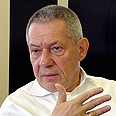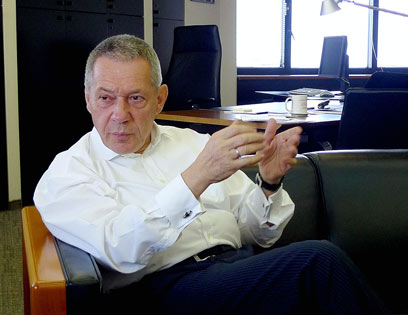
'German-Israel relations extraordinarily close'
Special: Outgoing German Ambassador Dr. Harald Kindermann speaks about checkered family past, Berlin-Jerusalem relations and the unexpected compassion he found in Israel
"My father was a soldier in the Nazi Army,"
German Ambassador to Israel Dr. Harald Kindermann candidly told Yedioth Ahronoth. "I don’t want to go into the details of what he did and were he served, but I was not encouraged by what I learned."Kindermann's diplomatic post in Israel will end this week after five and a half years, and the German statesman confesses that his stay has rendered him virtually in love with Israel.
Despite his father's checkered past, he says, Israel has been kind to him: "No one has ever reproached me for that. On the contrary – everyone thought that because of my history they should help me discover the past. They knew I was not to blame for my father's past."
His mission to Israel, which he described as "very special to me," provided him with closure but speaking of his father remains difficult. "I don't want to go into details. He passed away just six months ago, at 91. I've spoken about it with my friends at Yad Vashem. Being in Israel encouraged me to talk to him about it, and we first talked about it when he was 89.
"Towards the end, our relationship was better than ever, even though I discovered hard things about his past."
Kindermann says his family was reluctant when they learned his diplomatic career steered him in Israel's direction. "No one ever talked about Israel in my family… it was always taboo."
His elderly parents and relatives never expressed any interest in visiting him here, "But other relatives and friends have… I can say that there was a change over time. My 90-year-old aunt said to me, 'you look good. Israel agrees with you.'"
Unexpected kinship
Sixty-two-year-old Kindermann is a professional diplomat, who served as Berlin's envoy in Saudi Arabia and Bulgaria. His next post will take him to Sweden, and he is the longest-serving German ambassador to Israel.
Still, he sheepishly admits to having "very little talent for languages, despite being a diplomat," and says that in his time in Israel, he only learned about three words in Hebrew.
His family history had a significant impact on his service in Israel and Kindermann says he has found kinship among elderly German-Jews. "They were first to go back to Germany after the Holocaust and make peace between us.
"It couldn’t have come from us and we wouldn’t have come this far without them. I feel a personal kinship with them."

'Kinship with German Jews' (Photo: Yariv Katz)
His time in Israel, he says, has changed him for the better, lending him a broader understanding of the country; which he says bears a political effect as well: "Israel is a nation under threat. You know that. But there in no military threat in Germany. The borders are open… the average German doesn’t understand what living under threat means… I feel obligated to try and bring this message to my friends in Germany."
Not surprisingly, Kindermann has had his share of encounters with Israelis who generally boycott German products and cannot stand to hear the German language. The decision, he says, is more than understandable: "Their relatives were murdered in Auschwitz… I'm not sure I would behave differently."
The fact that he is the son of a Nazi officer may be shocking to most, "But you have to understand that there were a lot of Nazis in Germany… millions were part of the system. For a German man of my years it's normal to have relatives that were part of that system. I'm second generation. It's a simple fact."
In Israel, he stressed, that simple fact earned him anything but hostility and the reaction to him was largely compassionate and understanding. "This is why I object to the notion that being the German ambassador in Israel is difficult. Israelis don’t use the Holocaust as leverage for a political debate. It would be anti-Semitic to claim otherwise."
Kindermann has visited the Yad Vashem Holocaust Museum dozens of times – over 30 by his count, "And not only with official mission. I've taken relatives there. The death camps are beyond the grasp of a 16-year-old German boy, but they were very interested."
Fabric of relations
"Israel and Germany enjoy a friendship no one expected given the Holocaust," he says. "Israel is a very important financial partner… and it's also a model for Europe on immigrant absorption. We have a lot to learn from you."
But what about Berlin's ties to Iran, whose leaders repeatedly deny the Holocaust and call for the annihilation of the State of Israel? "A holocaust denier is a threat to Israel and the world and this calls for severe sanctions," he states adamantly.
"But one must not confuse (Iranian President) Ahmadinejad with the Iranian people. Sanctions against the regime – yes; but we must also find a way to communicate with the Iranian opposition, to find partners for a better relationship, that would ensure that Iran does not pose a threat to Israel."
Jerusalem and Berlin, he adds, also enjoy strong military and security ties. Israel is on the verge of purchasing an advanced submarine from Germany, and over 30 military missions from Berlin have visited Israel in the past year alone.
"We conduct serious talks about Iran behind closed doors. We discuss formulating strategies and share important intelligence," he says.
But is everything really so idyllic and rosy? "Naturally, there are ups and downs," he says. "The most important thing is that Chancellor Merkel has a personal relationship with Israel's leaders. She takes them seriously."
Any disagreements only prove the parties are trying to promote the issues. "The only one in Europe to openly speak about Israel as a Jewish state is Merkel. That is a fact. That's why I don’t like the attitude that talks about tension. The real picture is different – the relations are extraordinarily close," he says.
When asked about Germany's supposedly decreasing involvement in the negotiations to secure the release of Gilad Shalit, Kindermann said that, "It's not a question of mediation, but of Hamas. The mediator can make a suggestion and advance the talks, but you cannot broker a deal on your own. At the end of the day, the buyer has to decide if he is willing to pay the price and the seller has to decide if he is willing to sell."
Israeli PR problematic
Once thing seems to truly pain the German ambassador. Israel, he somberly says, has a serious PR problem.
"People think that peace is simple, that all you have to do is wish for it, and that you don’t really want it. For them, Israel is a strong, thriving country and the Palestinians are suffering. Israel is perceived as Goliath to the Palestinian's David."
Kindermann believes that the best way to bring about change is to have as many Germans as possible visit Israel and vice-versa. "The more Germans see of the real Israel, the more they will talk about it – instead of about the one they see on television."
Once his mission in Sweden ends, Kinderman is likely to retire – and return to Israel to do some volunteer work with the German church in Jerusalem.
When asked what he is most likely to miss about Israel, he noted the Israeli candor and free public discourse. "I'll also miss my walks on the beach in Herzliya and the light. You have light all year round, even in winter. It's wonderful."
Kindermann said he is a little less likely to miss the local cuisine – "I don't really like hummus and falafel. I live on yogurt, and you have the best yogurt in the world."
The one thing he says he is sure not to miss is the traffic: "Israeli traffic was much too stressful for me. But I somehow made it through without having an accident."
- Follow Ynetnews on Facebook










